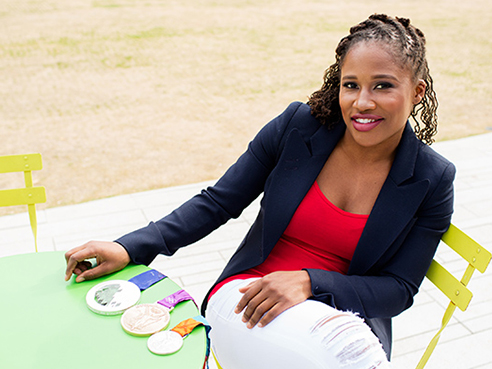Ask an Expert: AAU Alum Lauryn Williams (Part 4)
03/01/2018
Once every two years, the greatest athletes from around the world represent their countries with pride and compete to etch their names in the history books. There may be no one better equipped to break down what it takes and what the stage feels like more than AAU alum Lauryn Williams.
Once every two years, the greatest athletes from around the world represent their countries with pride and compete to etch their names in the history books. This massive event is truly a spectacle, and there may be no one better equipped to break down what it takes and what the stage feels like more than AAU alum Lauryn Williams.
As one of only five athletes, and the first woman, to take home hardware in both winter (bobsledding) and summer (sprinting) events, Williams can provide unparalleled advice and knowledge on the topic.
Our friends at Eastbay sat down with the legendary competitor to hear all about her experiences on the global stage.
PART 4: LIFE AFTER HER ATHLETIC CAREER
Q: As your athletic career started winding down, was it hard to adjust to life post-track?
A: “It was definitely very difficult. Transition is always hard for athletes, because so much of our identity is tied to our sport. We have to spend a lot of time making sure that we don’t get so tied up in the pressure of the moment and only see ourselves as an athlete. We need to spend more time on who we are as an individual, outside of sports. That gives us the best chance of transition, but there’s no way you can prepare perfectly from sport to life after sport. It’s going to be tough for every elite athlete to say ‘I am no longer that, I am now this’. But if you prepare yourself as much as possible while you’re still competing, that can make the transition much easier.”
Q: Along those lines, you founded Worth Winning, a financial advisory company dedicated to helping fellow athletes and young professionals. How did that come about?
A: “Well, I was a finance major and always had an interest in math and money. Once I got out of college, I decided to go pro (in track), but I always still had this interest in finance. I hired a financial advisor in my own life, because I knew that was important. The problem was, the advisor didn’t do a good job of helping me organize my finances. I needed help with things like creating a budget and figuring out how much rent I could afford – and the advisor wasn’t cutting it.
I started asking my friends about stuff like this and noticed a gap. They were pretty elusive and didn’t really want to talk about it. I decided that it was up to me to be the change that I wanted to see. I wanted to take a holistic approach and look at all aspects of a person’s finances. Nobody was really focused on serving young professionals.
It’s tough for athletes because we need to plan for two retirements: one from sport and one from your job after your athletic career decades down the road. You need to be very forward-thinking about those things, and I felt like I’d be the best person to help. Who better than someone who has gone through all those same things?”
Q: Has your athletic career helped in the financial world?
A: “Oh, for sure. One of the biggest things that has helped me advance my career in the finance world has been the idea that I’m not competing individually, but that I’m trying to help the whole team. I am always open to sharing with others what I’m up to. If I can help you, I should share it. It’s not about having one right answer. The more we know, the better off we all are. A lot of the info people shared with me during the Games are things that I have now applied in finance.”
 Email
Email Print
Print









